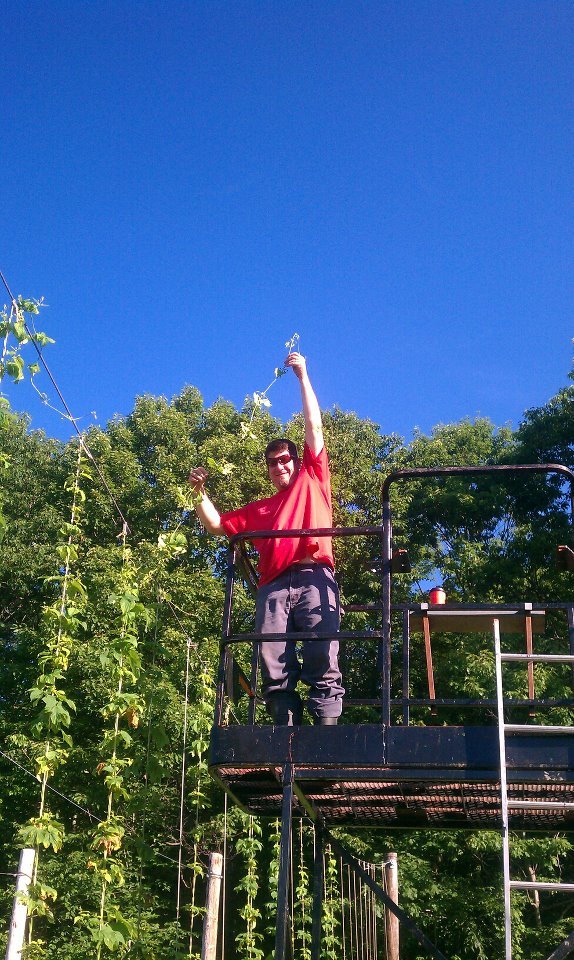Beer is becoming a more local product all the time.
Douglas and Jeff Therrien started Rock Island Hop Farm two years ago on their parents’ 10-acre property in Springvale, and they are already selling all of the hops they can produce.
Hops are the aromatic or spicy parts of beer. German purity laws say that beer can be made only with water, malt, hops and yeast, and although many beers include other ingredients, the hops are essential.
American hops traditionally come from Oregon and Washington, and the Therriens have been getting their seedlings from Willamette Valley Hops in Oregon.
But with many Maine brewers putting out beer with all-Maine ingredients, there is a market for local hops.
“We got into this because we are beer nuts,” Jeff told me when I dropped in to visit the hop farm last week. “We are just crazy about beer, especially IPAs.”
Growing hops just seemed like a natural extension of the Therriens’ love of beer, especially since they had all the land available at the home where they grew up.
Doug lives in Waterboro, while Jeff lives a mile away from the farm in Springvale, and both are third-generation employees at Central Tire in Sanford. They tend the hop farm either before or after going to their full-time jobs.
Hops are vines, and they like to grow tall. By using recycled utility poles and more than 1,000 feet (and counting) of 5/16th-inch steel cable, they have planted about 500 plants of different varieties.
The Therriens have a friend who works for a utility company in the Kennebunks, and when old poles are available, they get a call. They cut the poles into 20-foot lengths and put them 4 feet into the ground, giving the hops 16 feet of growing height — although some plants have reached the top and started going sideways.
The hop farm has a truck with a stand on the rear, so when they have to work 16 feet up on the top cable, one person can be on the rear of the truck while the other drives slowly between the rows.
When a hop plant takes root, a rope is strung from the cable and attached to the ground next to the plant. At harvest time, the lines are cut at the top, allowed to fall, and cut into lengths so the actual picking of the hops can be done inside.
Doug Therrien said all of the farm’s Cascade hops have been promised to Kai Adams for Sebago Brewing Co.’s Local Harvest Ale, a beer that I look forward to every year. They have also been selling a lot of Centennial hops to Chresten Sorenson of Bunker Brewing in Portland.
Jon Cadoux of Peak Organic Brewing Co. has come down to help with some of the harvesting, and has expressed an interest in the product.
Jeff Therrien said they have received some requests for Saaz, a traditional hop for Pilsener, but they are not sure they can get the seedlings. They are hoping to plant some next year.
All of the Therriens’ hops have been used as wet, fresh hops and put into the beer shortly after being picked. Most beers use dried hops, or hop pellets, but fresh, wet hops provide a floral flavor and aroma that can add a lot to a local beer.
Rock Island is not an organic hop farm. Before even thinking about it, Jeff Therrien said, they used granular fertilizer on the hops when they first planted them. And they said the fertilizer did give the plants a great boost.
In addition, a few weeks ago the hop plants were covered by a swarm of Japanese beetles, and they used a pesticide to deal with them.
Rock Island is not the only hop farm in Maine. Several others have been in business longer, and Sebago has even gotten some of its hops for Local Harvest from home gardeners.
But with more people wanting to go local with their food and drink, Rock Island has plans to expand, and there likely will be more Maine hop farms in the future.
For those wondering how the Rock Island name is appropriate in landlocked Springvale, the Therriens have an answer.
The property has been used in agriculture for decades, for both crops and as a dairy farm. And there is one area in the middle of the field where the farmers put the rocks that they wanted to get out of the way.
That is the Rock Island.
Tom Atwell is a freelance writer living in Cape Elizabeth. He can be contacted at 767-2297 or at:
tomatwell@me.com
Send questions/comments to the editors.



Success. Please wait for the page to reload. If the page does not reload within 5 seconds, please refresh the page.
Enter your email and password to access comments.
Hi, to comment on stories you must . This profile is in addition to your subscription and website login.
Already have a commenting profile? .
Invalid username/password.
Please check your email to confirm and complete your registration.
Only subscribers are eligible to post comments. Please subscribe or login first for digital access. Here’s why.
Use the form below to reset your password. When you've submitted your account email, we will send an email with a reset code.